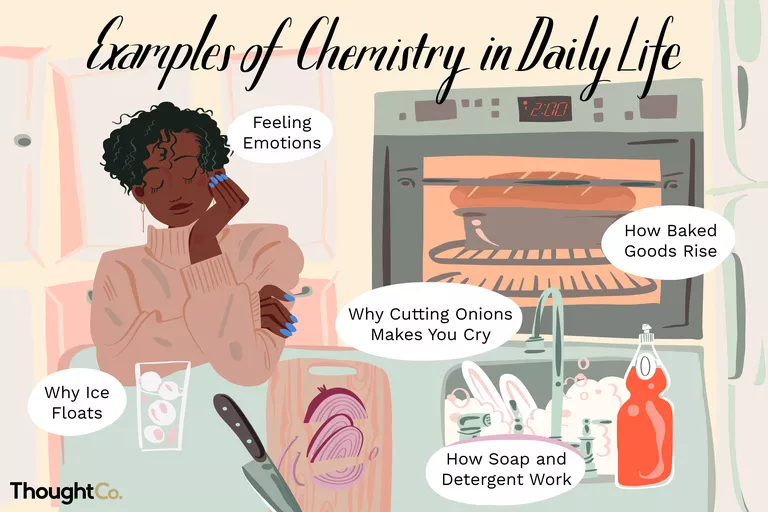Просмотр содержимого документа
«611 20.03.20 Тема "Химия в быту"»
Chemistry in Daily Life 10 Examples of Chemistry All Around You 
By Anne Marie Helmenstine, Ph.D.
Updated October 15, 2019
Chemistry is a big part of your everyday life. You find chemistry in foods, the air, cleaning chemicals, your emotions, and literally every object you can see or touch.
Here are 10 examples of everyday chemistry. Some common chemistry might be obvious, but other examples might surprise you.
01
Elements in the Human Body
Your body is made up of chemical compounds, which are combinations of elements. While you probably know your body is mostly water, which is hydrogen and oxygen, can you name the other elements that make you?
02
Chemistry of Love
The emotions that you feel are a result of chemical messengers, primarily neurotransmitters. Love, jealousy, envy, infatuation, and infidelity all share a basis in chemistry.
03
Why Onions Make You Cry
They sit there so harmless-looking on the kitchen counter. Yet as soon as you cut an onion, the tears begin to fall. What is it in onions that makes them burn your eyes? Everyday chemistry is the culprit.
04
Why Ice Floats
Can you imagine how different the world around you would be if ice sank? For one thing, lakes would freeze from the bottom. Chemistry holds the explanation for why ice floats while most other substances sink when they freeze.
05
How Soap Cleans
Soap is a chemical that mankind has been making for a very long time. You can form a crude soap by mixing ashes and animal fat. How can something so nasty actually make you cleaner? The answer has to do with the way soap interacts with oil-based grease and grime.
06
How Sunscreen Works
Sunscreen uses chemistry to filter or block the sun's harmful ultraviolet rays to protect you from a sunburn, skin cancer, or both. Do you know how sunscreen works or what an SPF rating really means?
07
Why Baking Powder and Baking Soda Make Foods Rise
You can't interchange these two important cooking ingredients, even though they both cause baked goods to rise. Chemistry can help you understand what makes them different and what to do if you run out of one but have the other in your cabinet.
08
Does Some Fruit Ruin Gelatin?
Jell-O and other types of gelatin are an example of a polymer that you can eat. Some natural chemicals inhibit the formation of this polymer. Simply put, they ruin Jell-O. Can you name them?
09
Can Bottled Water Go Bad?
Food goes bad because of chemical reactions that occur between food molecules. Fats can become rancid. Bacteria can grow that might make you sick. What about products that don't contain fat? Can bottled water go bad?
10
Is It OK to Use Laundry Detergent in the Dishwasher?
You can apply chemistry to decide when and where to use household chemicals. While you might think detergent is detergent, so it's interchangeable from one application to another, there are good reasons why laundry detergent should stay in the washing machine.
Source:
Examples of Chemistry in Everyday Life


















